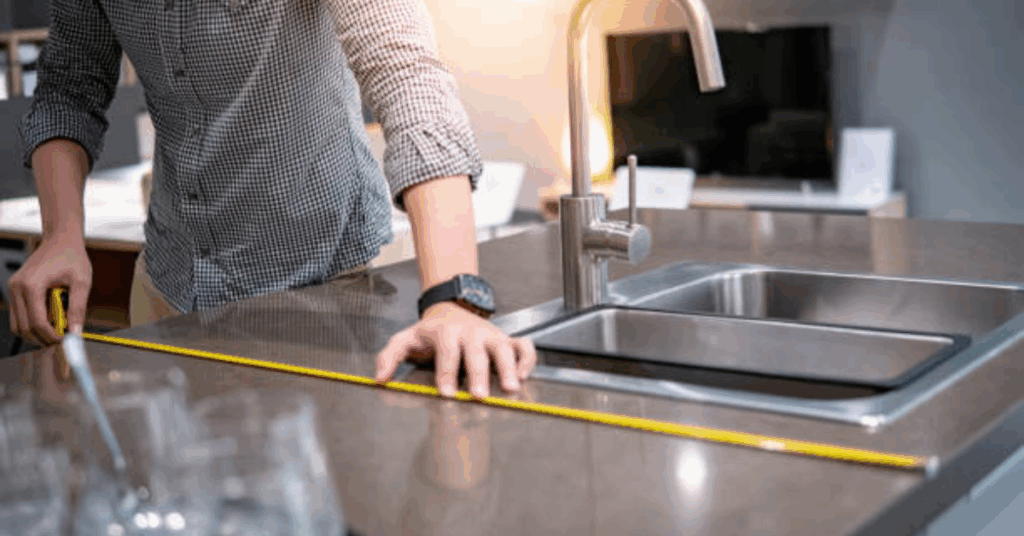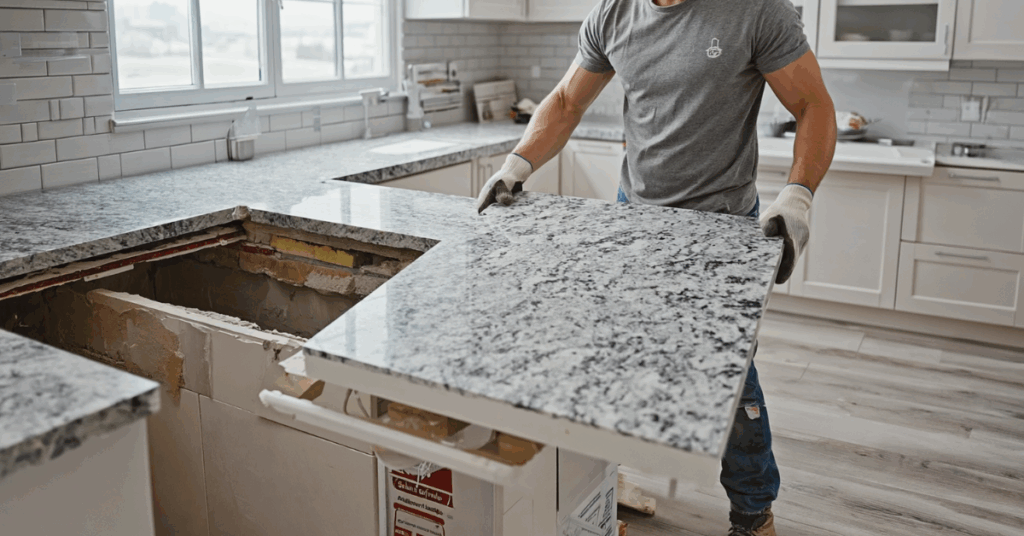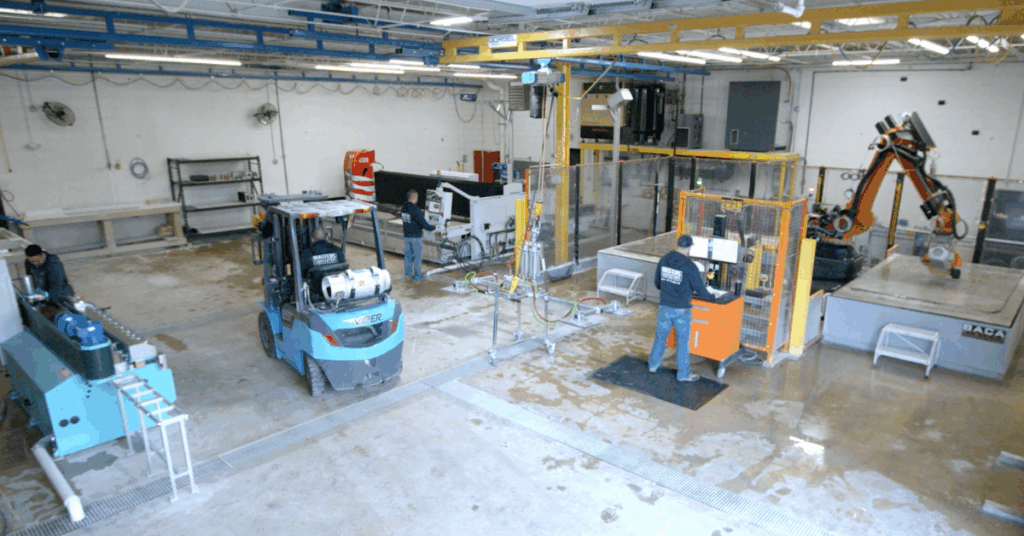Can I Install My Own Countertops? Pros, Cons, and Real Costs

Upgrading your kitchen or bathroom with new countertops can transform the look and feel of your home—and even increase its value. Once you’ve chosen the perfect stone, the next decision is whether to hire a professional or tackle the installation yourself.
The idea of a DIY countertop project is appealing for many homeowners. After all, you can potentially save on labor costs, have complete control over the process, and enjoy the satisfaction of doing it yourself. But is it really worth it? And more importantly—can you actually do it right without professional tools and experience?
In this guide, we’ll break down:
- The real costs of DIY vs. professional installation
- The removal process for old countertops
- The pros and cons of self-installation
- Safety and technical challenges you need to know
- When to DIY and when to hire an expert
Why People Consider DIY Countertop Installation
There are two main reasons homeowners think about installing countertops themselves: cost savings and personal satisfaction.
Labor costs for countertop installation vary depending on the material, size of the project, and region, but can easily run anywhere from a few hundred to over a thousand dollars. If you’re on a budget, avoiding these costs is tempting.
There’s also the “I built this” pride factor. For homeowners who enjoy DIY projects, the thought of measuring, cutting, and installing their own stone can sound exciting—almost like the ultimate home improvement challenge.
The Reality: Countertops Are Not a Typical DIY Project
Installing countertops is nothing like painting a room or assembling furniture. It requires specialized tools, precise measurements, heavy lifting, and often multiple people to execute correctly. The risk of damaging expensive materials—or your cabinets, walls, or floors—is real.
For natural stone and engineered surfaces like granite, quartz, or quartzite, slabs can weigh hundreds of pounds.
This is why professional installers not only have the tools but also years of experience handling and fabricating stone without breaking it—or injuring themselves.

The Countertop Removal Process
Whether you install your new countertops yourself or hire a professional, your old countertops will need to be removed first. Here’s what that process typically involves:
- Disconnecting Plumbing & Appliances
Sinks, faucets, and sometimes dishwashers must be disconnected. This step alone can be tricky if plumbing lines are old or corroded. - Removing the Old Countertops
Materials like laminate can be unscrewed and pried off, but stone removal requires extra care. Granite or quartz can crack if lifted improperly, and the weight makes it a two- or three-person job. - Disposing of the Old Material
Some homeowners underestimate this part—stone slabs are heavy, and disposal often requires renting a truck or paying a disposal service. - Prepping the Cabinets
Cabinets must be level, sturdy, and properly reinforced before new countertops go in. Any unevenness can cause cracks in stone materials later.
Many professional installers include removal and disposal as part of their service. If you DIY, you’ll have to plan for all of the above yourself.
Can You Install Countertops Yourself? The Pros & Cons
Pros of DIY Installation
- Lower upfront cost – You avoid labor charges, which can make a significant difference in the total project cost.
- Full control over timing – You can work on your schedule rather than waiting for an installer’s availability.
- Personal satisfaction – If you’re skilled and have the tools, the sense of accomplishment is huge.
Cons of DIY Installation
- Special tools needed – Lifting equipment aren’t items most homeowners own.
- Heavy lifting – Countertops are extremely heavy, making it unsafe to attempt installation alone.
- Risk of damage – Breaking or scratching a slab during DIY means buying a replacement at full price.
- No warranty – Most material warranties require professional installation to remain valid.
Real Costs: DIY vs. Professional Installation
Let’s break down a realistic comparison:
| Expense | DIY | Professional |
| Labor | $0 | $300 – $1,200+ |
| Tool rental/purchase | $100 – $500 | Included |
| Material handling (delivery) | $50 – $200 | Included |
| Disposal fees | $50 – $150 | $4-$6 per sq.ft |
| Risk factor (damage replacement) | Potentially $500+ | Covered by installer |
| Total Estimated Cost | $200 – $850 + materials | $300 – $1,200 + materials |
At first glance, DIY looks cheaper. But if something goes wrong—a slab cracks during handling, a cut is off by even half an inch, or the seam alignment looks sloppy—the costs of fixing mistakes can quickly exceed what you would have spent on professional labor.
When DIY Might Work
DIY installation might be an option if:
- You’re installing lighter materials like laminate or butcher block.
- You already own the necessary tools and have prior experience.
- You have at least one or two strong helpers for lifting and positioning.
- The project is small and straightforward (like a laundry room or small bathroom vanity).

When You Should Hire a Professional
Professional installation is strongly recommended for:
- Stone materials like granite, quartz, quartzite, and marble.
- Large kitchens or projects with complex layouts.
- Integrated sinks or custom edge profiles.
- High-end materials where one mistake could be very costly.
Not only do professionals bring the tools and expertise, but they also handle everything from templating (digital measuring for a perfect fit) to vein matching (aligning patterns for a seamless look).
The Risk to Your Home Value
One of the main reasons people replace countertops is to increase home value. Professionally installed countertops not only look better but can also be a selling point. Poorly cut, uneven, or mismatched DIY countertops can have the opposite effect—making your home look less polished and lowering its appeal to buyers.
If resale value is a major goal, professional installation is almost always the smarter choice.
Bottom Line: Is DIY Worth It?
If you’re confident in your skills, have the right tools, and your material is lightweight and forgiving, DIY installation can save money. But for most homeowners—especially those working with heavy, high-value materials—the risks outweigh the savings.
Professional installers bring precision, efficiency, and peace of mind, ensuring your investment looks great and lasts for decades.
📍 If you’re ready to replace your countertops and want the perfect balance of quality and speed, Masters Countertops can help.
From helping you choose the right material to precision digital fabrication and professional installation, we handle everything—so you can enjoy your beautiful new space without the stress.
💻 Get an instant quote today on our website and see your estimated price delivered directly to your inbox.
Like what you see? Follow us for more design inspiration, expert tips, and the latest trends in natural stone and quartz countertops. Don’t forget to share!
